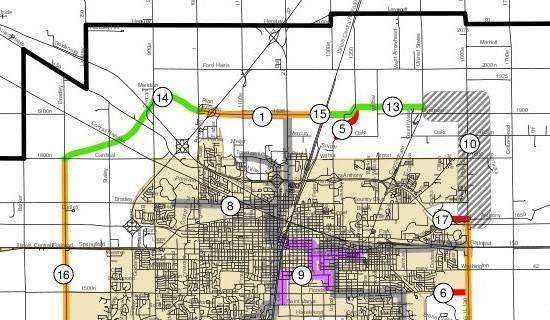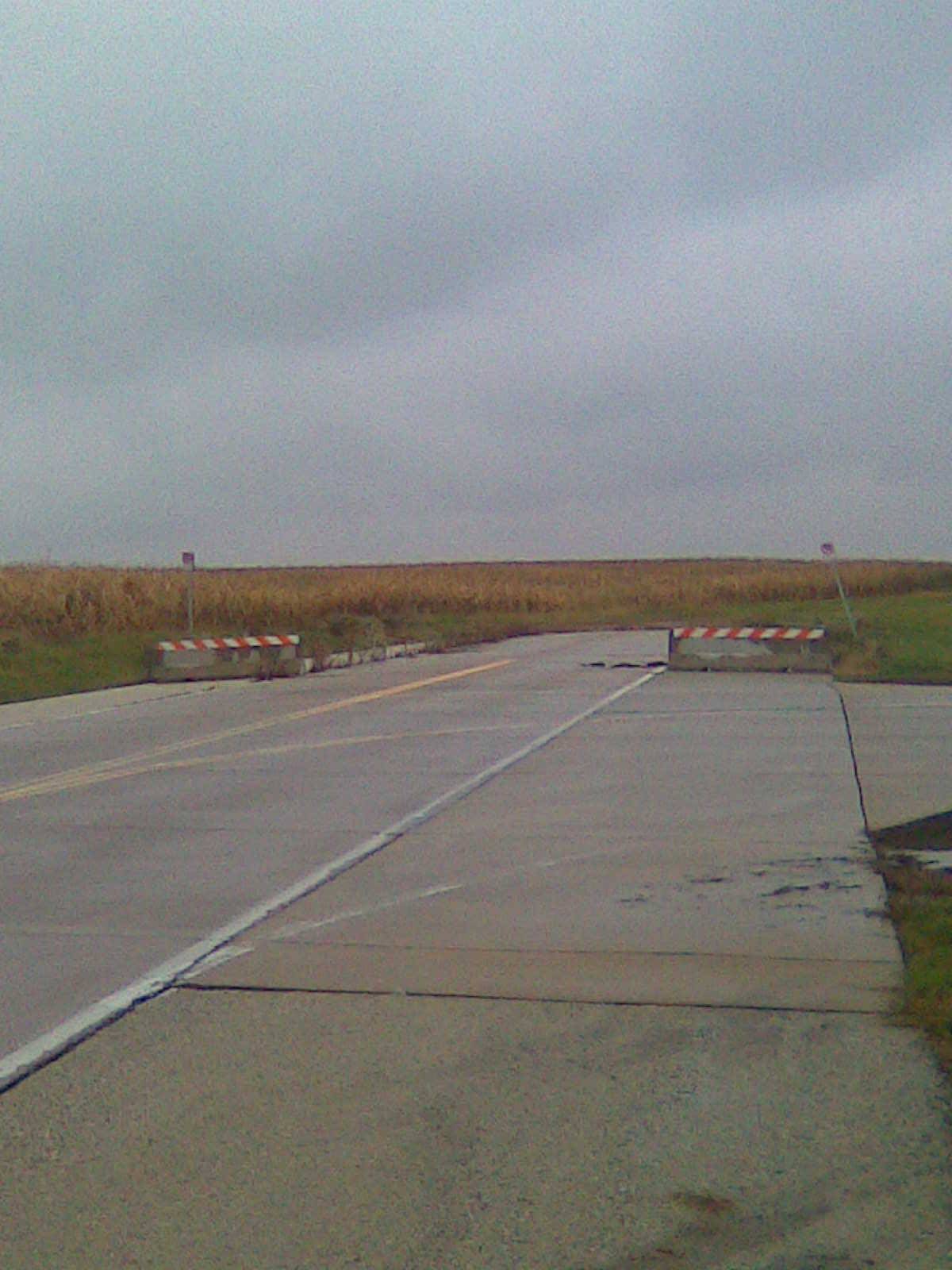
After 30 years of talk and planning, the Olympian Drive Extension is closer to becoming a reality. Some feel the extension would bring progress and economic growth; others feel that it would lead to unnecessary development and endanger a valued rural area. The $27 million extension — which would connect Olympian Drive where it currently ends east of North Market Street to Route 45 — is stalled right now because of funding issues, but is very much a possibility.
WHAT’S IT ALL ABOUT?
John Dimit is a supporter of the extension. He is the President/CEO of Champaign County Economic Development Corporation (CCEDC), an organization that describes itself as “a public-private partnership dedicated to fostering a cooperative, county-wide approach to economic development.” As a former Executive Director of Champaign County Regional Planning Commission as well, he’s been a part of the Olympian Drive discussion for decades.
Dimit and other supporters of the project say the road is about making it easier for people to get to and from existing industrial corridors, not about aiding urban sprawl north of Champaign-Urbana. “It’s more an access point for truck traffic. We don’t suspect that Olympian Drive will become an East/West North Prospect. It absolutely is not about having another place to put up a big-box store,” he said.
Bill Gray, Director of Public Works for the City of Urbana, offered a similar description for the intention of the road: “The road’s purpose is to improve access, relieve I-74 congestion, spur economic development, create jobs and housing, and improve traffic circulation.”
Leslie Cooperband is a leader of the protest against the extension, and has created a petition against the project. She is a co-owner of Prairie Fruits Farm at 4410 North Lincoln, and describes her business as “Illinois’ first farmstead cheese-making facility.” If the road goes through, it will pass just yards to the south of her property.
In her own words, Cooperband feels that the real purpose of the road is more about “light industry development on prime farmland.” As far as access goes, she stated that she doesn’t buy “the argument that this is going to increase connectivity for those businesses that are already adjacent to I-74, or those that are on the west side of the tracks.”
Supporters of the road say that nothing ominous is planned, but rather that it’s merely about enhancing the economic value of existing areas. “The city of Urbana’s comprehensive plan for decades has called for the North Lincoln area to be an industrial corridor,” Dimit said. The extension, supporters believe, would make this corridor more profitable for the entire community.
However, Cooperband feels there is a different agenda: “The City of Urbana’s long-range plan has this area zoned for light industrial development. Part of their argument is that the road will foster that type of development.” As an owner of a business that depends in part in an atmosphere of rural charm, this is something she doesn’t want.
ENVIRONMENTAL IMPACT IN A VALUED RURAL AREA
Key to the discussion of the road is the argument of how much it will affect the rural area it would pass through. Opponents of the road feel that it will pass through an irreplaceable area. “There are only two other places in the world — in South America and in the Ukraine — that have soil of similar qualities,” stated Cooperband, who holds a doctorate in soil science from Ohio State University. She writes in her petition that if the road goes through, “We lose prime agricultural lands situated on some of the best prairie soils in the world.” She feels that there aren’t enough reasons in the case of this road to justify paving over any such soil.
Supporters of the road feel that whatever environmental impact there will be is unavoidable and not enough reason to stop construction. Dimit stated that the planners of the road have studied the situation enough and have green-lighted the project in this respect. “The environmental work has pretty much been completed,” Dimit said, and mentioned a study by the Transportation (CUUATS) division of Champaign County Regional Planning Commission has been done.
In response to an e-mail request for this CUUATS study, Bill Gray, Director of Public Works for the City of Urbana, wrote the following: “There are two documents — TR (Township Road) 151 Scoping Study completed in 1991 and the Olympian Drive Location/Design Report completed in 1997.”
NATIVE AMERICAN GRAVES
One noteworthy claim on the petition against the road is that if the extension goes through, “We destroy Indian graves and remnants connected to the original inhabitants.” When questioned by this writer as to the exact location of these graves, Cooperband indicated that she had heard about their existence from neighbors but had not been to them herself.
Dimit acknowledges that Native American artifacts have been found for years in the area the road would traverse, but said there are no graves that he knows of.
EFFECTS ON FARMING
The road would pass through some farms that have been in the ownership of the same families for decades. Opponents of the road feel that it would be devastating to these “Centennial Farms.” Cooperband writes in her petition, “This road would bisect prime farmland just north of Urbana-Champaign and destroy forever the unique agricultural community that has existed in this area since the end of the Civil War.”
Supporters of the project feel that such statements are overblown, and that a two-lane road would not be overly detrimental to existing farms, Centennial or otherwise. “It may very affect the profitability of large-scale farming. In terms of boutique farming, I don’t think it would affect the profitability at all,” Dimit said.
EFFECTS ON EXISTING BUSINESSES
An argument against the road is that it would affect specialty businesses like Cooperband’s, which depend on the existing aesthetic of the region. Prairie Fruits makes money serving food and Cooperband said, “It is first and foremost with us a business issue. Our business would be directly negatively impacted by this road. Part of our business depends on people coming out to have dinners in a rural setting.”
 Supporters of the road disagree that the road has to end such rural-themed endeavors. In terms of the potential dangers to existing businesses in the area in general, Dimit said, “I think it’s a road through the property. I don’t think we have to lose the business at all.”
Supporters of the road disagree that the road has to end such rural-themed endeavors. In terms of the potential dangers to existing businesses in the area in general, Dimit said, “I think it’s a road through the property. I don’t think we have to lose the business at all.”
Moreover, as other supporters of the project have mentioned repeatedly, he points out that this particular extension has been in the works since the 1970’s: “It is a bit troublesome to me,” Dimit said, “that people who were well aware that the road was going to be built went ahead and purchased land up there and established businesses and are now objecting to the road. Because the road has been on the books for years. “
When questioned why she purchased land in the path of the road in the first place, Cooperband said, “When we moved here in 2003, there were so many uncertainties about the likelihood that this road would happen in any reasonable time frame, that we did not perceive that it was an imminent threat to us developing our farm business.”
WHAT’S BEST FOR BUSINESS?
Ironically enough, both sides say that what they want will be good for the overall business community. Cooperband points out that many of people who sell goods at Urbana’s Market at the Square on Saturdays have to travel long distances to get there. She argues that leaving Olympian Drive as it is would allow the development of rural businesses such as her own. Furthermore, mentioning the City of Urbana’s efforts towards being more green, she said, “It gives the city an opportunity to put their money where their mouth is in terms of their talk of wanting to be more sustainable.”
Supporters of the road disagree, and that the extension would bring better access to existing developed areas and the positive things that would go with it. “Even Rantoul supports the development of Olympian because it provides better access to employment opportunities that exist north of 74,” Dimit said.
He makes the argument that businesses in the area north of I-74 like Frasca Field Airport have been expecting this road for years and have been planning accordingly; not to build it now would be “irresponsible.”
IF OR WHEN?
One of the major obstacles to getting this road completed for so long has been money. As it stands now, the funding is not quite in place. Towards changing this, Dimit and other community members recently made a trip to Washington to urge lawmakers to contribute. In Dimit’s words, “The only way to stop the road is to not have money to build it,” and after returning from Washington he feels that the money will eventually be there.
Cooperband and others feel that there’s still time to stop the road if enough voices against it can be heard. She urges likeminded people to sign her petition to share with lawmakers. In her words, “This project is NOT a done deal as many have been lead to believe.”








